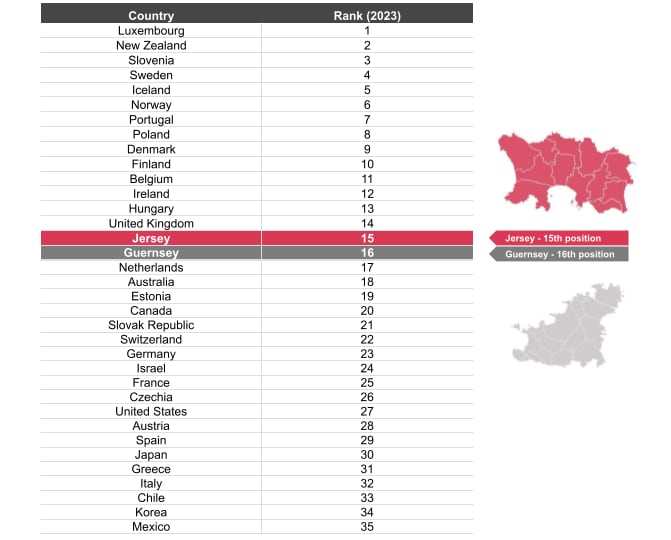
Progress towards gender equality in the Channel Islands will take decades to achieve if the current pace of change continues.
Despite some progress on the gender pay gap in Jersey and low female unemployment in both islands, we are falling behind other major economies like Luxembourg, Ireland, New Zealand and the UK when it comes to workforce parity.
Both Guernsey and Jersey have high numbers of ‘non-employed’ women, as well as both men and women who are not economically active over the age of 50. This is particularly concerning with near full employment and critical skills gaps in the local economy. Combined with rapidly ageing populations in both islands and a shrinking working age workforce, this is a worrying trend that must be addressed.
The economic benefits of improving female labour force participation in Jersey and Guernsey would be significant:
- Firstly, to address current critical skill gaps - Geek Talent identified just under 2,500 job vacancies in Jersey and Guernsey in August 2022 (a typically quieter month for job adverts).
- Second, to boost economic prospect. Our analysis indicates that if we were able to match the female labour rate of Sweden, a 2% increase in GDP would be achieved in Jersey (equating to £77m annually) and 6% increase in GDP in Guernsey (£194m annually).
- And third, closing the gender pay gap would deliver further gains in female earnings of 12% in Jersey (£187m) and 18% in Guernsey (£159m).
Jersey ranks the equivalent of 15th place in the PwC Women in Work Index of the 33 OECD countries and Guernsey is just behind in 16th place. Luxembourg tops the Index in first place, followed by New Zealand and Slovenia in third place. The UK is positioned in 14th place.
“An 18 year old woman entering the workforce today will not see pay equality in her working lifetime. At the rate the gender pay gap is closing, it will take more than 50 years to reach gender pay parity. In the Channel Islands we have a critical need for more talent and skills to drive growth and economic prosperity. We must make it a top priority to attract and incentivise everyone who is able and wants to, back into the workforce. Where we have known barriers to that being achieved, we must remove them.”
Leyla Yildirim, Chief Strategy Officer, PwC Channel IslandsChannel Islands' Performance
PwC’s research team used the same criteria to assess how Jersey and Guernsey would perform if included in the Index rankings, based on comparable data. Those findings show that Jersey ranks the equivalent of 15th place in the PwC Women in Work Index of the 33 OECD countries and Guernsey is just behind in 16th place. Luxembourg tops the Index in first place, followed by New Zealand and Slovenia in third place. The UK is positioned in 14th place.
Jersey's gender pay gap of 11% compares well against the OECD average of 14%. However Guernsey's gender pay gap of 16% positions it in 22nd place on the OECD index. In contrast, Luxembourg has a gender pay gap of only 0.5%.
The latest Index acknowledges there are people who can afford not to work or for a variety of reasons have chosen not to work, however, it is more likely that significant barriers such as the lack of flexibility from employers and the high costs of childcare are disincentivising women in particular from working full time or working at all. When childcare costs and parental leave benefits are compared with the leading territories, Jersey is behind the curve in terms of support for women and parents, but Guernsey is significantly far behind.
During our research, we have also identified a talent pool of both men and women who are not economically active over the age of 50 in both islands. This presents a further opportunity to potentially boost the labour force.
Women in Work Index: this year's results
Out of the 33 OECD countries, the top three performers this year are Luxembourg, New Zealand and Slovenia.
- Hungary made the greatest improvement in its rankings, rising nine places on the Index from 22nd to 13th place.
- Switzerland reported the largest drop in ranking, falling six places on the Index from 14th to 20th place.
Including Jersey and Guernsey in the OECD rankings:
- Jersey would rank 15th position on the Women in Work Index 2023.
- Guernsey would rank 16th position on the Women in Work Index 2023.
Next steps
The analysis makes the following recommendations designed to speed up progress on workforce parity in the Channel Islands. They are:
- Government actions:
- A strategy to target ‘non-employed’ talent pools - specifically focused on getting people back into work.
- A review of parental leave and childcare entitlements - are these competitive?
- Incentives to encourage women back into work - looking at ways to further support childcare costs is key.
- Upskilling and reskilling programmes - providing free, easy to access training on the most in-demand skills. Consider incentives for employers to provide training too.
- Consider legislative moves to encourage employers to be more open to flexible working patterns and to report on areas like gender pay gap.
- Business actions:
- Gather data to understand your workforce demographic and equality gaps. Set targets around these and be willing to monitor and report for transparency.
- Broaden recruitment to appeal to a wider demographic. Consider offering ‘back to work’ training to help ‘returners’ from career breaks learn key skills.
- Embrace flexibility and be willing to consider a variety of flexible requests - different age groups will have different needs, but most will welcome flexibility.
- Consider parental leave and benefits to support both mothers and fathers.
- Review your culture - is it genuinely inclusive and an environment where everyone has an equal chance to thrive and succeed?
- Any focus on gender equality should be leadership-led and accountable.
Contact us
















